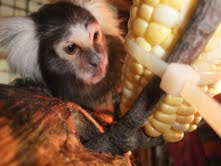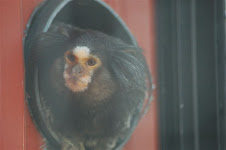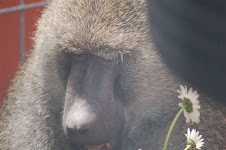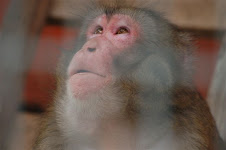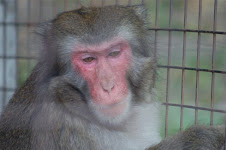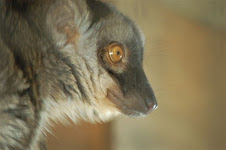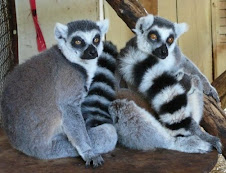For immediate release
December 4, 2013
Story Book Farm
Primate Sanctuary marks Darwin’s First Anniversary
On December 10, 2012, Story Book Farm Primate Sanctuary in
Sunderland, Ontario welcomed Darwin - dubbed "The IKEA Monkey" by
social media. In this past year, we have
experienced the joys of seeing him grow from an infant who had not been socialized
with other monkeys to a confident, intelligent, socially aware juvenile. As
with other young primates, he needs to be taught by members of his “troop” –
appropriate vocalizations, gestures and behaviours. In the early months, milestones of his
development were noted by his first attempts at grooming and vocalizing. He was thrilled to have the opportunities to
climb, jump and explore. His area and
enrichment are frequently changed, in order for him to develop new muscles and
coordination skills. He spends his days
interacting with Sweet Pea, and Pierre (Olive baboons), Lexy and Julien
(Japanese macaques) and his human caregivers. In this safe environment he is
thriving, exploring, growing and learning. We are thrilled that he has now
acquired his distinctive primate “voice”!
Darwin particularly enjoys stuffed Curious George monkeys, playing in
water, eating dates and grooming Sweet Pea.
Darwin is also now reflecting behaviours, for instance, he takes Curious
George to the tub for a bath, shows him where to drink and how to groom. The staff of Story Book Farm would all like
to wish Darwin a very happy anniversary!
When visiting this fall, award-winning author and former
primatologist Andrew Westoll
stated: “Darwin has literally come leaps
and bounds since arriving at Story Book Farm Primate Sanctuary. He has shed his
human clothing and begun learning how to be a monkey again. This, after a long
year of court dates, groundless accusations and bitter acrimony, is an absolute
triumph. And it wouldn't have been possible without the incredible volunteer
staff of Story Book Farm Primate Sanctuary."
On September 13, 2013, Justice Mary Vallee delivered an
important decision confirming that Darwin will continue to live at the
sanctuary. As a wild animal, his needs are those, not of a pet or pseudo-child,
but of an intelligent, sentient, unique being who must be with his own kind.
Unfortunately, this decision is now being challenged, yet again. This distracts
and detracts from our vital work of caring for other monkeys whose lives were
forever altered by humans who have used them in research, entertainment, as
pets or for breeding to supply the demand for exotic pets.
We would like to include a special and heartfelt thank you
to everyone who has supported us through this difficult year and continues to
do so – it is encouraging to know that we are making a difference. We are honoured that Liz Marshall, the
director of the critically acclaimed award-winning documentary "The Ghosts in Our Machine"
included Story Book Farm Primate Sanctuary in her film. We are also grateful to Brent Roe and Scotch
Camera, who collaborated with Pockets Warhol on the ground breaking Art
Pioneers art show at the Gladstone Hotel.
Pockets, his joy of painting and art work have led to shows in Tallinn,
England, Rome and Helsinki.
We will continue to provide Darwin with a high quality of
life as he matures and grows. He is now able to live and express his behaviour
as a Japanese macaque and fulfill his destiny that was established at birth.
If you would like to make a donation to support the work of
the sanctuary, please visit our website. You can follow us on Facebook and Twitter and YouTube.
For media enquiries, and telephone interviews, please
contact us at sbfpsanctuary@gmail.com.
Unfortunately media interviews cannot be conducted on-site at this time.
About Story Book Farm
Primate Sanctuary
Story Book Farm Primate Sanctuary (SBFPS) is a licensed,
OSPCA inspected, sanctuary for primates who come from a variety of backgrounds.
The sanctuary is located approximately
one hour north east of Toronto. Currently, we are home to twenty five primates.
We, at SBFPS, are committed to educating and raising awareness about the plight
of captive primates, advocate on behalf of primates who do not have a voice of
their own and help prevent cruelty to animals through the operation of a
primate sanctuary. The sanctuary is
staffed by experienced primate volunteers and community members, whose
backgrounds include field work, sanctuaries and zoos around the world. The sanctuary’s operating budget is approximately
$80,000 per year. We do not receive any
government grants and are solely supported by private donations. We encourage
the public to contribute to our work and to give a gift that keeps on giving.
Donations for Darwin’s and our other residents’ care can be made at www.storybookmonkeys.org.
Story Book Farm Primate Sanctuary is a place of safety. We
offer freedom from fear. We are a place of healing and recovery from trauma. In
sanctuary care, we encourage friendships between residents. We encourage
exploration and freedom of choice. We give back the ability to make decisions
and control events that affect residents' lives. Our human caregivers exercise
deep observation skills to help address the residents' wants and needs. We
strive for humility and parity and look at each day as a learning
opportunity.
Story Book Farm Primate Sanctuary is a registered Canadian
charity (84081 7910 RR0001)


















